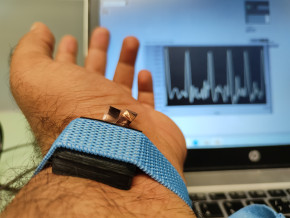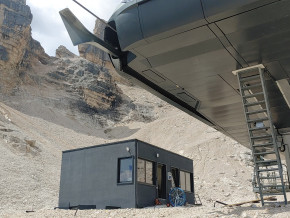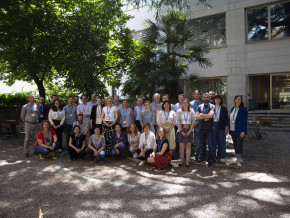Driverless Cars: Ready or Not, Here They Come
Before the year is out, autonomous vehicles will roam city streets in some countries around the world. It’s the start of a major technological revolution that will transform how we get from A to B over the next 15 years. Are we ready for it? unibz professor Federico Boffa, an expert in the regulatory challenges facing the transportation industry, helps us understand how legislators are dealing with the changes.
Proponents of driverless cars say the technology will save us time, promote social inclusion (for people who are not able to drive), reduce traffic congestion and help the environment. Is there any reason not to like this technology?
Federico Boffa: A few occupations will become obsolete—drivers, for example. Some people will lose their jobs, of course, and in the short run this will certainly create problems. However in the long run, as autonomous vehicles take over driving, people will reallocate themselves to other activities, which will definitely improve productivity.
The taxi industry has been very vocal in their opposition to ride-sharing companies such as Uber. And now, the US tech start-up NuTonomy is set to introduce a fleet of autonomous taxis to Singapore this year. It’s not a great time to be in the taxi industry, is it?
Boffa: In the next ten years, if not earlier, most taxi drivers will probably lose their current jobs. But a great analogy I heard recently made reference to the former job of elevator lift attendants. When autonomous elevator lifts were introduced in the 1900s many lift attendants lost their jobs. But for a while, some countries (and some states in the US) maintained mandatory lift operators. It was a form of welfare. I wouldn’t be surprised if, for five or ten years following the introduction of autonomous taxis, we will have a ‘driver’ present in the vehicle. He won’t do anything, but people will feel safer, and it will allow taxi drivers a buffer period to either retire or find another occupation.
In May 2015, the Italian court ruled to ban unlicensed companies such as Uber from operating its ride-sharing service in Italy. Considering the inevitability of technological reforms, is legislation like this anti- progressive?
Boffa: If a country consistently opposes all forms of innovation, then yes, in the long run it will be a problem: companies like Uber will invest their technology money in a country where the regulations are more favorable. Technological innovation should instead encourage legal innovation. But in the case of Uber and its ride-sharing alternative to taxis, we have to try to put ourselves in the shoes of the taxi drivers. At some point in the past they made an upfront payment to the State of maybe 100,000 euros or more to purchase a medallion that gave them the right to run a taxi service in a quasi-monopolistic setting, that is, without competition from closely substitute services. So the issue becomes more philosophical than economic: is it fair to renege on implicit promises? And how much can you trust a government if they create a law that allows you to pay for a quasi-monopoly right, but that law proves not to be perennial?
What’s the answer then?
Boffa: Ideally, we should look for new solutions to compensate taxi drivers, instead of banning the entrance of new operators that offer valuable services to consumers. It’s what the independent Italian transportation regulator, the Autorità di regolazione dei trasporti, has suggested be put in place. One solution could be to determine how much those people paid for their medallions and then compensate them for a portion of it through the public purse. Of course, there is a clear drawback, in that it puts a strain on budgets. Another option would be to require companies such as Uber and Lyft to contribute a share of the costs, or to hire some of the taxi drivers (at least before the fleet becomes autonomous).
Isn’t it possible that aggregators like Uber could themselves be out of business some day? For example, what stops us from sharing an autonomous vehicle with friends on Facebook and foregoing the ‘middleman’?
Boffa: That is debatable. Some observers argue that peer-to-peer will indeed replace Internet platforms such as Uber and Lyft, but it seems to me that these platforms are actually efficient ways to match demand with supply. In addition, one could argue that it is much better to have some sort of aggregator to centralise the traffic flows of autonomous cars: by knowing exactly where the traffic is at any point in time, and by having accurate short-term forecasts of traffic flows, jams can be avoided and routes scheduled much more efficiently. It is interesting to note that both car manufacturers and technology companies are actively involved in the development of autonomous vehicles. All these different industries are heading in the same direction, and it is not clear who will prevail over the other and become the market aggregator. We’ll have to wait and see. And it’s going to be exciting to figure out.
Related Articles

Tecno-prodotti. Creati nuovi sensori triboelettrici nel laboratorio di sensoristica al NOI Techpark
I wearable sono dispositivi ormai imprescindibili nel settore sanitario e sportivo: un mercato in crescita a livello globale che ha bisogno di fonti di energia alternative e sensori affidabili, economici e sostenibili. Il laboratorio Sensing Technologies Lab della Libera Università di Bolzano (unibz) al Parco Tecnologico NOI Techpark ha realizzato un prototipo di dispositivo indossabile autoalimentato che soddisfa tutti questi requisiti. Un progetto nato grazie alla collaborazione con il Center for Sensing Solutions di Eurac Research e l’Advanced Technology Institute dell’Università del Surrey.

unibz forscht an technologischen Lösungen zur Erhaltung des Permafrostes in den Dolomiten
Wie kann brüchig gewordener Boden in den Dolomiten gekühlt und damit gesichert werden? Am Samstag, den 9. September fand in Cortina d'Ampezzo an der Bergstation der Sesselbahn Pian Ra Valles Bus Tofana die Präsentation des Projekts „Rescue Permafrost " statt. Ein Projekt, das in Zusammenarbeit mit Fachleuten für nachhaltiges Design, darunter einem Forschungsteam für Umweltphysik der unibz, entwickelt wurde. Das gemeinsame Ziel: das gefährliche Auftauen des Permafrosts zu verhindern, ein Phänomen, das aufgrund des globalen Klimawandels immer öfter auftritt. Die Freie Universität Bozen hat nun im Rahmen des Forschungsprojekts eine erste dynamische Analyse der Auswirkungen einer technologischen Lösung zur Kühlung der Bodentemperatur durchgeführt.

Gesunde Böden dank Partizipation der Bevölkerung: unibz koordiniert Citizen-Science-Projekt ECHO
Die Citizen-Science-Initiative „ECHO - Engaging Citizens in soil science: the road to Healthier Soils" zielt darauf ab, das Wissen und das Bewusstsein der EU-Bürger:innen für die Bodengesundheit über deren aktive Einbeziehung in das Projekt zu verbessern. Mit 16 Teilnehmern aus ganz Europa - 10 führenden Universitäten und Forschungszentren, 4 KMU und 2 Stiftungen - wird ECHO 16.500 Standorte in verschiedenen klimatischen und biogeografischen Regionen bewerten, um seine ehrgeizigen Ziele zu erreichen.

Erstversorgung: Drohnen machen den Unterschied
Die Ergebnisse einer Studie von Eurac Research und der Bergrettung Südtirol liegen vor.
